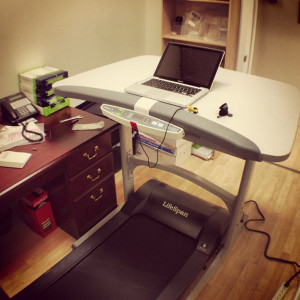The desk-bound lifestyle of a college student can be harmful to one’s health. According to Runner’s World’s Selene Yeager, sitting for large amounts of time each day is linked to increased risks of heart disease, diabetes, cancer, and even depression. Experts even went as far as labeling this present health epidemic as the “sitting disease.”
All of the time that students spend hunched over in class, at their computer, or ‘kickin’ it at the crib’ is harmful for even the healthiest person. Escalating amounts of research has been showing that those who spend hours at a time sitting die earlier than those who sit less often, regardless of how active the person is outside of their sedentary lives.
Being inactive with your bum stuck in a seat for hours at a time has been recognized as a practice that is comparable to smoking. While this may be a bit of a stretch, the reasoning behind this conclusion is that people know smoking is bad for a person’s health, just as remaining sedentary for hours at a time can be bad for even an active person’s wellbeing.

In 2012, a study was published in the International Journal of Behavioral Nutrition and Physical Activity stating that people spent an average of 64 hours a week sitting, 28 hours standing, and 11 hours non-exercise walking regardless of whether or not they exercised the recommended 150 minutes a week. To break it down further, that would mean that on average, people are sitting for more than nine hours a day.
According to Yeager, experts say most people are not running, walking, or even standing enough to counteract all the harmful results from sitting around nine hours a day.
According to a report published in 2013 by the Harvard Business Review, the human body is designed to move, and it begins undergoing metabolic changes after just one hour of sitting. The production of enzymes that burn fat declines by as much as 90 percent. For example, prolonged sitting affects HDL levels (good cholesterol) in our bodies, and research shows that this lack of physical activity is directly tied to six percent of the impact for heart diseases, seven percent for type 2 diabetes, and ten percent for breast cancer or colon cancer.
A study published in the American Journal of Epidemiology reports that a man who sits more than six hours a day has an 18 percent increased risk of dying from heart disease and a 7.8 percent increased chance of dying from diabetes compared with someone who sits for three hours or less a day.
The American Institute for Cancer Research links prolonged sitting with increased risk of both breast and colon cancers. In addition, Alberta Health Services-Cancer Care in Canada linked long periods of daily inactivity to 49,000 cases of breast cancer, 43,000 cases of colon cancer, 37,200 cases of lung cancer, and 30,600 cases of prostate cancer a year.
In order to address the issue, consider standing to do things when sitting is not a necessity. While you’re taking time to talk on the phone, checking your email, texting, or even reading for class, use the time to stand up and even walk around. Take study breaks every half hour to move around and take the stairs as often as possible.
For those with a desk job, there are options available to prevent workers from sitting all day while doing their work. Some options include treadmill desks, where users can walk on a treadmill at a slow pace all day long while conducting work at their desk. Another option is a taller desk designed so that users have to stand to use it. Companies all over are adopting these desk styles in order to promote better health for their employees.
Doing these things in addition to exercising, staying hydrated, eating right and sleeping well can help to avoid adopting habits that will compromise your health just as much as the nasty habit of smoking would.